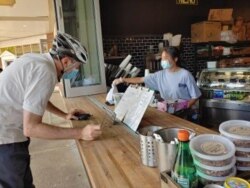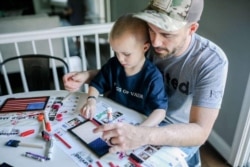Small business owners in the United States are wondering how to preserve their companies as the coronavirus pandemic tightens its grip. Reinvention may hold the key.
The U.S. Congress passed a measure to provide billions of dollars in relief packages to help small businesses stay afloat. But even with that assistance, “Many small companies are still struggling to reopen, and others will never reopen,” said Tom Sullivan, vice president for small business policy at the U.S. Chamber of Commerce.
The 30 million small businesses in the United States, most of which have no more than 75 employees, need to reinvent themselves, Sullivan told VOA. “There’s definitely a new normal, and I don’t think companies can go back to the way they were before COVID-19.”
Markos Panas, founder of the Bread and Water Company in Alexandria, Virginia, outside Washington, D.C., knows this all too well. “When the coronavirus kicked open the door, it was sink or swim, and we realized we had to make a lot of changes,” he said.
Like many small businesses, Bread and Water lost at least half of its revenue after the pandemic hit. The number of customers quickly dwindled as people stayed home.
Panas said a $10,000 CARES grant has helped the bakery remain open.
“We immediately went into survival mode,” he said, “and the pandemic actually forced us to streamline the business. Before we were trying to do too much, and just breaking even as a wholesaler, restaurant, and bakery,” he said.
That push from the pandemic meant “We became a full-time, carry-out operation, with online ordering, something we hadn’t done before,” said Panas.
He also learned that less can be more.
“We reduced our bread and pastry offerings, and provided a better variety of sandwiches, and our customers were happy with the changes,” he said. “And we trained the staff to do more than one job.”
“We’re functioning better,” Panas added, “and already making more money than we did before.”
Companies that aren't making changes are going to find it difficult to survive, said Joe Shamess, a former military pilot who is the co-owner of Flags of Valor in Ashburn, Virginia.
The firm employs combat veterans who handcraft American flags from wood for display.
“Our company has had to change the way we do business,” Shamess said.
Like Bread and Water, Flags of Valor cut its retail sales. “We improved our website, focused on online sales, and concentrated on making smaller, more affordable flags for the average consumer,” he said.
“We also created kits for children, so they could make their own flags, and a health care heroes kit to show support for the millions of health care workers who are helping to fight the pandemic,” Shamess said.
The NightLight Pediatric Urgent Care clinics in Houston, Texas, decided virtual was the way to go.
“The eight clinics are in shopping centers, so in a way, we run it like a retail business and wanted it to be super accessible,” said Zawadi Bryant, the CEO.
“Even though we had the capacity to start telemedicine visits, there wasn’t much interest in it,” she said.
Then came COVID-19, “which caused a major drop in the number of children we were seeing.”
“That’s also when people latched on to the idea of telemedicine and business picked up,” Bryant said. “We trained the staff how to do it, and almost all the patients became virtual.” Patients’ parents appreciated the convenience of telemedicine and are comfortable interacting with the doctor remotely.
She believes the clinics will combine walk-ins and virtual telemedicine in the future.
Couch Clarity, which provides psychotherapy services in the Chicago suburbs, also went virtual.
“We had to do a complete about-face and train our staff practically overnight how to do teletherapy, which is something we've never done before,” said Melissa Bercier, the company president.
“It was uncomfortable for some therapists who are trained not to reveal too much about themselves,” she said. “And suddenly we're having clients looking at us in our homes.”
The move online helped the practice retain most of the clients, Bercier said, “because they felt more comfortable in their own home environment and didn't have to leave the house.”
In the long term, “we would like to continue both online and face-to-face therapy,” said Bercier.
Bread and Water Company’s Panas said, “It’s challenging to let go of what you’re used to, but now is the perfect time to reimagine what you can do.”
This story has been updated to correct a name spelling. VOA regrets the error.






